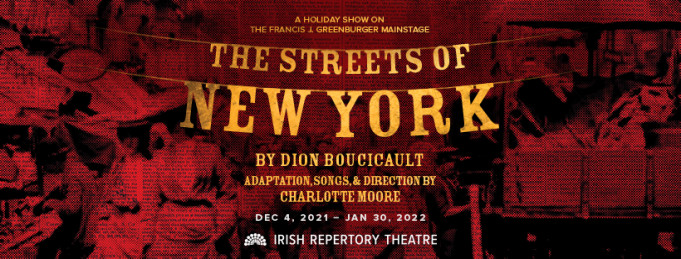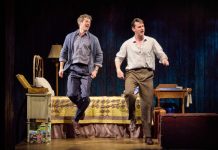First presented at Off-Broadway’s Irish Repertory Theatre in 2002, in the aftermath of 9/11, The Streets of New York is back live on stage through the end of January in the company’s current pandemic-era revival. Based on the 1857 melodrama The Poor of New York by Irish playwright and actor Dion Boucicault, the adaptation, songs, and direction by Irish Rep Artistic Director Charlotte Moore capture the emotional elements and heartfelt message inherent in the original story about the impact of the City’s 19th-century financial crises on both the haves and have-nots, along with the comedic aspects of its dastardly and heroic characters, for an increasingly engaging and uproarious musical melodramedy with a moral.
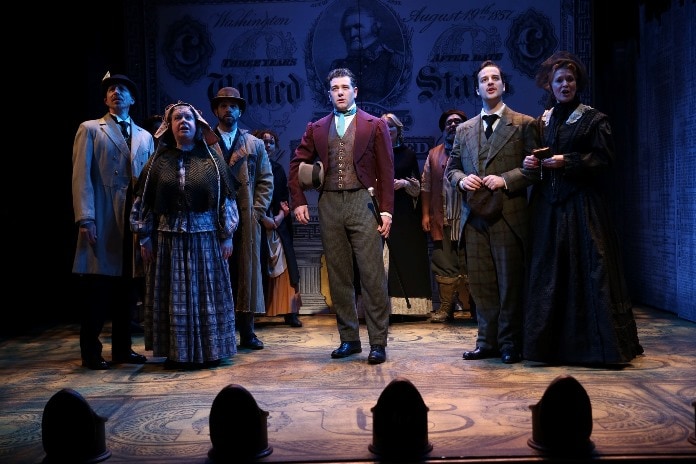
Beginning with the Panic of 1837, when the failure of banks triggered an economic depression that lasted into the 1840s, the Prologue opens with a woeful array of NYC characters performing Moore’s glum and tearful title song in a dark and dreary thunderstorm under umbrellas filled with holes, before the telling backdrop of a monumental $100 bill. The narrative then shifts in locale and tone to the bright, colorful, and well-appointed office of the ridiculously wealthy and nefarious banker Gideon Bloodgood, who is planning an escape to London with all the money of his depositors. Add to that the $100,000 just brought to him after hours by sea captain Patrick Fairweather, unwittingly intended as a secure investment to provide for his family during the collapse.
But the money is instead embezzled by the corrupt Bloodgood after being recorded by his clerk Brendan Badger, who, when the sailor conveniently keels over dead in front of them, retains the receipt to blackmail his boss. Their felonious deeds set off an exceedingly tangled chain of events and familial interconnections in Acts I and II, set 20 years into the future during the Panic of 1857, pitting rich vs. poor and dishonest vs. honorable, until all the riotous actions and over-the-top plotting are exposed and ultimately resolved through the overwhelming power of love and good.
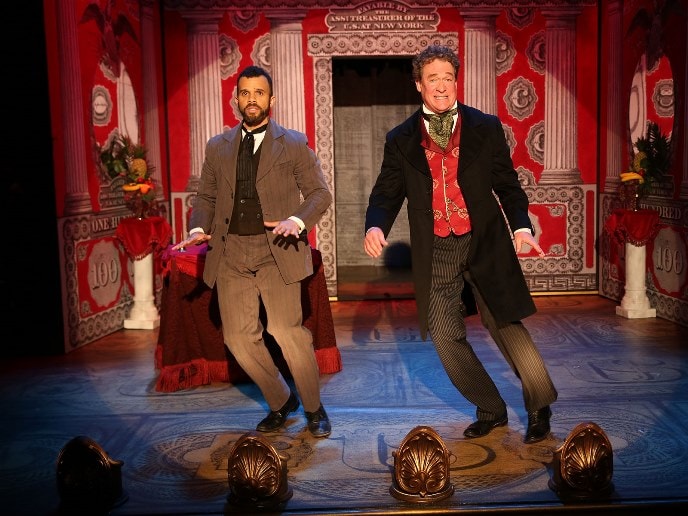
The entertaining cast delivers the driving themes of the immoderation of wealth, the trauma of poverty, the endurance of love, and the saving grace of generosity with the requisite sincere commitment and exaggerated humor that befit the Victorian genre to a T. Taking the lead are the terrific David Hess as Bloodgood and Justin Keyes as Badger, whose character-defining song-and-dance number “Villains” (with lively Vaudevillian-style choreography by Barry McNabb) provides one of the laugh-out-loud showstoppers, as does Amanda Jane Cooper’s performance of “Oh How I Love Being Rich,” in the rapacious role of Bloodgood’s spoiled, entitled, demanding, and manipulative daughter Alida (which signals the comical content of the show).
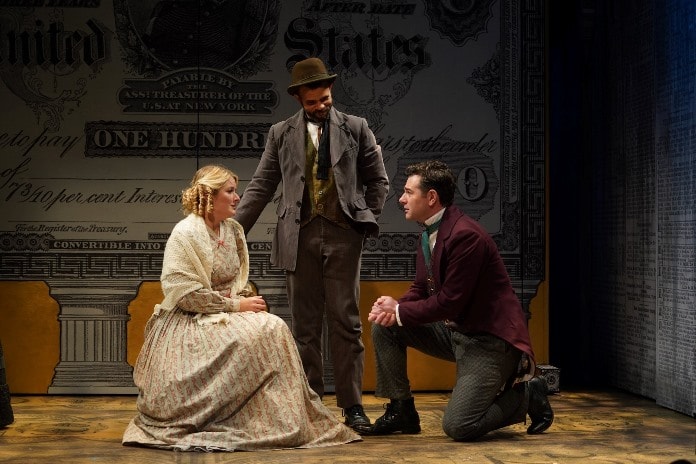
In their stalwart portrayals of the now impoverished and self-sacrificing Lucy Fairweather (Patrick’s daughter) and upright gentleman Mark Livingstone (who share an attraction that is thwarted by Alida’s intent to have her father buy him for her to marry), DeLaney Westfall and Ben Jacoby bring an expressive mood of noble sensitivity and righteousness to their characters. And their outstanding semi-operatic duets on “We Must Never Say Goodbye,” “I Never Told You that I Loved You,” “Where Is Spring?,” and “Poor Wounded Heart,” number among the vocal highlights of the show (accompanied by Melanie Mason on cello, Jeremy Clayton on woodwinds, Karen Lindquist on harp, Sean Murphy on bass, and Joel Lambdin on violin, with music direction, arrangements, and co-orchestration by Mark Hartman, and Yasuhiko Fukuoka serving as associate conductor and co-orchestrator)
Rounding out the fine ensemble are Amy Bodnar, Kerry Conte, Richard Henry, Daniel J. Maldonado, Polly McKie, Ryan Vona, and Price Waldman (subtly noteworthy as Bloodgood’s eye-rolling servant Edwards). Their performances are supported by period-style and class-appropriate costumes by Linda Fisher, hair and wigs by Robert-Charles Vallance, and props by Deirdre Brennan. Hugh Landwehr’s set smartly evokes the story’s era and its focus on money or the lack thereof, and lighting by Michael Gottlieb and sound by M. Florian Staab effectively contribute to the status and situations of the characters.
The Streets of New York not only amuses with its combination of old-fashioned melodrama, parodic comedy, and emotive music, but also leaves us with the ever-resonant reminder that those who are among the most fortunate in society should “Take Your Brother’s Hand” and give to the poor, not exploit them.
Running Time: Approximately two hours and 15 minutes, including an intermission.
The Streets of New York plays through Sunday, January 30, 2022, at Irish Repertory Theatre, 132 West 22nd Street, NYC. For tickets (priced at $45-70), call (212) 727-2737, or go online. Everyone must show proof of full COVID-19 vaccination and a valid photo ID to enter the building and must wear a properly fitting mask covering nose and mouth when inside.
If you can’t make it to The Streets of New York, you can catch Irish Rep’s excellent series of digital productions created during the pandemic shutdown, on screen and on demand on the company’s Theatre@Home platform. Offering works by James Joyce, Conor McPherson, Geraldine Hughes, Eugene O’Neill, J.M. Synge, Elaine Murphy, and more, the rentals are $25 per show with access for 48 hours from time you hit “watch now” on the production page.


